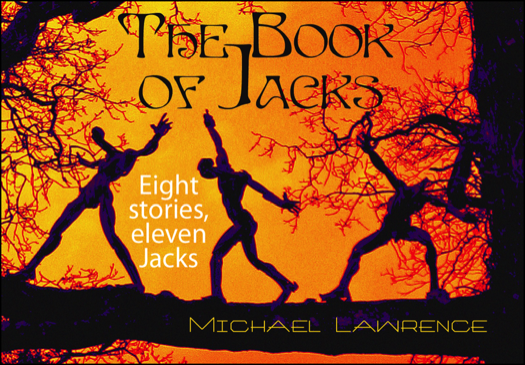THE BOOK OF JACKS
WORDYSOD : Michael Lawrence www.wordysod.com
A Writer's Website
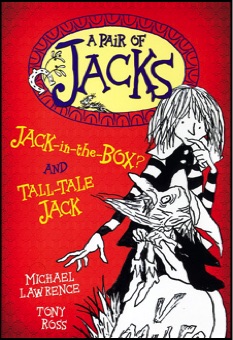
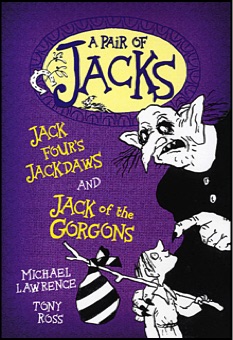
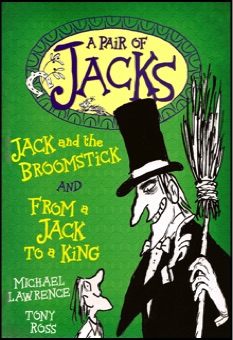
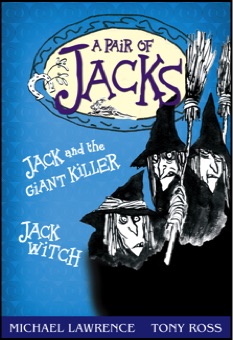
It may be that there aren't that many heroes named Jack in classic fairy tales, but as it's a name I associate with such stories, I wrote eight new ones with something of the feel of those golden oldies. In mine every main character is called Jack. I wanted all eight stories to appear in a single volume as The Book of Jacks, but the publisher who eventually took them issued them in four volumes, each containing two stories. However, it remained an ambition to see them all together, and the cover on the left is for my privately printed eight-story version. Scroll down to read one of those stories.
The covers shown below are of the four published volumes, with Tony Ross illustrations.
MY INITIAL PITCH FOR THESE STORIES
Jack has always been a popular name for the heroes of legends, fairy tales, pantomimes and the like: Jacks off seeking fortunes, killing giants, climbing beanstalks, canoodling with princesses, tangling with ogres, and generally getting into all sorts of scrapes, sometimes surviving in triumph but often coming out of things rather less well.
THE BOOK OF JACKS is a collection of brand new but fairly timeless stories about boys and young men called Jack. Here we meet heroic Jacks and foolish Jacks, noble Jacks and hopeless Jacks. There's a Jack who's turned to stone by a gorgon but lives to invent a famous cheese, a Jack who sets out to catch a witch and meets more than he bargained for, and a Jack who has three brothers (also called Jack), each of whom is sent off to find the family fortune and meets a disastrous end.
Oh, there should be a Jack for everyone in...
THE BOOK OF JACKS
From a Jack to a King
This story takes place in the tiny tucked-away kingdom of Raggedass. Like most kingdoms, Raggedass had a king and queen, and in the course of three decades Queen Twess of Raggedass had given birth to four children. The eldest was Prince Effluvium, the second eldest was Prince Vomitus, and the third eldest was Princess Nettlerash. Only the youngest, the last born, did not bear a royal-sounding name. He was called Jack.
Prince Jack was called Jack for a very good reason. The very good reason was that his parents couldn't be bothered to think of anything more grand for him. Why? Because they were ashamed of him. Ashamed because, unlike them, unlike his brothers and sister, he was very short. I mean really short. No one that short, they decided at first sight of him, could possibly command the grovelling respect of the common people. At the age of seven the top of Prince Jack's head was on a level with his father's knee. By the age of ten it just about reached his father's cod-piece. Three years later it ran parallel with his father's nipples, and there it stayed.
On his fourteenth birthday, still only nipple high, Prince Jack received an unusual present from his parents. A wooden hut. The hut had been specially built for him on the very periphery of the kingdom, between the gate and the steaming cesspool where Raggedass's waste was dumped. The birthday gift came with a royal note ordering him to keep away from the palace from this day forth because the hut was his home now. Besides, the note concluded, someone had to close the gate. The young prince, a lad of generous spirit who only ever saw good in people, felt that a great honour had been bestowed upon him. Proudly he planted flowers round his hut, oiled the hinges of the gate, and every two days, because no one else would do it, put on a gas mask and stirred the cesspool with his rolling pin to stop a skin forming.
In contrast to Jack's humble hut, the royal palace, which stood at the top of Raggedass Hill, was a splendid sight. Quite spectacular it was, all white and gleaming, with lots of towers and turrets and cupolas and flags, and battlements patrolled by dashing sentries in dazzling armour and helmets luminous with peacock feathers. The king and queen, who lived there with the two taller princes and their daughter, had no doubt who would inherit the throne once they kicked the royal bucket. It would go to their eldest son, Effluvium.
So let us now turn to that noble prince. Heir to the throne of Raggedass and tallest of the royal bunch, Prince Effluvium loved hunting. He loved hunting because he loved killing things. He would have hunted his own people if his father hadn't thought it might make them revolt. 'They're revolting enough already,' the king often said, without one whit of shame. So the prince had to content himself with hunting down helpless animals, but it was quite good fun, especially the bit at the end where he leapt from his horse with a princely 'Ha-ha! Now I have you!' and lopped their defenceless heads off. In his time Effluvium had lopped off at least one head of every species larger than a fist in the kingdom. The only head not to grace the walls of his apartments was that of the giant boar, which was almost extinct, so when news came that one had been spotted in Raggedass Forest the prince whooped for joy, called for his saddled horse, and rode down the hill and into the forest with forty bodyguards, beaters, archers and hairdressers.
Little Prince Jack watched the hunting party from the step of his hut between the cesspool and the gate. He would have cheered it on if he hadn't felt sorry for the boar. But he needn't have worried, for when the boar emerged from the forest half an hour later, far ahead of the pursuing entourage, it was quite unharmed. Prince Effluvium wasn't feeling too fit though, lying on the beast's great tusks twitching out the last two and a quarter minutes of his tall life.
'Ho, old boar!' cried Jack as the boar lumbered in his general direction. 'What have we here then?'
'It was him or me,' replied the boar, who'd learnt to speak on his travels in other forests where boars were more respected.
'I see your point,' said Prince Jack. 'Both of them actually.'
The boar's step faltered. A burly prince on your snout can take it out of you rather. 'I suppose you'd better kill me and get it over with,' it sighed resignedly.
But this did not appeal to little Jack. In fact, the very idea boared him silly. 'I wouldn't dream of killing you,' he said. 'I love animals, even animals as ugly as sin, like you. Anyway,' he added philosophically as his parents' tallest son gasped his last, 'I have another brother.'
And so he had: Vomitus, new heir to the throne of Raggedass.
Now Prince Vomitus wasn't much like his slightly taller but rather late older brother. He wasn't as surly for one thing, though what he lacked in surl he made up for in girth. In other words he was fat. Very fat. Stupendously, ridiculously, out-of-all-proportion fat. The reason Vomitus was so huge was that he ate too much. As Effluvium had lived to hunt, Vomitus lived to eat. Nothing in all the world was as important or interesting to this prince as food. He liked to eat and eat and eat, and when he'd finished eating he liked to eat and eat and eat some more.
But about a fortnight after he took over the position of heir-to-the-throne something happened to make Prince Vomitus lose weight dramatically. It started with the horse-drawn cart that pulled up one morning outside the hut between the cesspool and the gate.
'Pigs' eggs!' the driver cried. 'Finest fresh pigs' eggs for sale!'
Prince Jack came to the door. The tradesman looked down at him and smirked at his smallness. If he'd known he was in the presence of a prince he might have shown more respect, but Jack didn't look much like a prince. His clothes were ordinary, his hair was uncombed, his fingernails were bitten and dirty. He didn't even speak royally. His parents had bothered so little with him while he was growing up that he'd played with whoever he pleased – the stable lads, the royal cat skinners, the dung collector's apprentice – with the result that at fourteen he was as common as muck on a bad day.
'Since when did pigs lay eggs?' Jack said, inspecting the cartload of large pink eggs with curly little tails.
'Have you never heard of genetic engineering?' the tradesman answered. 'Now listen, Shortstuff, I'm willing to let you have this load – that's about three hundred eggs – for just forty coin of the realm. What do you say to that?'
'I say I haven't got forty coin of the realm,' said Jack. 'And even if I had what the blithering heck would I do with three hundred pigs' eggs?'
'They boil well,' said the man. 'Five minutes from boiling point to eggcup and you never tasted nothing so rich and satisfying in your little life. Five thousand calories per yolk. Just one will keep your stomach quiet for a whole day. Two, and you'll feel that you've eaten like a prince, or even a king.'
'And if you eat three?'
'You spend the next forty-eight hours on the bog wishing you'd never been born.'
'You could try the palace,' Jack suggested, pointing it out in case he'd missed it.
'I'll do that,' said the pigman, and headed for Raggedass Hill.
Now by chance the new heir to the throne was looking out of a third floor window as the tradesman drove up. Noticing the three hundred large pink eggs with curly little tails, his pupils dilated.
'I say!' he bellowed out of the window. 'You! My man! What hev you got thar?'
The eggman tugged the forelock he'd bought at the joke shop in the next kingdom. 'Oi got pigs' eggs, moi 'oighness,' he said, in that idiotic way that peasant tradesmen speak to royalty or the disgustingly rich. 'Three 'unnered on 'em, oi got.'
'Hev you, bay Jove,' said Prince Vomitus, who had speech problems of his own, but royal ones. 'Are theeeey... taysteh?'
'Lor luv yer, sorr,' said the jolly eggman. 'Tasty? Oi should say so. An' on'y two 'unnered coin o' the realm the laat.'
'Stay rate there! Dewn't move a muscle!' The prince unjammed his shoulders from the window and went through the loose change in his piggy bank. 'Ketch!' he said, tossing down a hundred and ninety-eight coins and two buttons.
The man tucked the loot into his shirt, tugged his new forelock once more, delivered the eggs to the kitchen, and drove back down the hill at a rate of knots, chuckling. Prince Vomitus, meanwhile, sent word to his disgruntled cook to boil the three hundred eggs to 'ebsolute parfection' and serve them in his personal dining room in forty-five minutes flat.
In forty-six minutes flat (rebellious lot, these peasants) the three hundred freshly boiled pink eggs were neatly arrayed on a pristine white cloth in the prince's dining room. Vomitus slapped his overweight lips and tucked a napkin the size of a sheet into his collar. He placed a footman on either side of him to whip the tops and tails off the shells as fast as they could so he could shove the contents down his gullet without pause and save himself from starving.
The first egg went down in a fraction of a trice. 'Yum!' cried the prince, and popped another in. 'Double yum!' cried he then, blithely reaching for a third, then a fourth, a fifth, a sixth, and so on, letting rip a right royal belch after every other one.
While the rest of the world went about its business with varying degrees of sanity, Prince Vomitus continued to shovel calorie-rich pigs' eggs down him as if there was a reward for stuffing yourself silly. There was, in a way. When Vomitus gulped down the 32nd egg his poor abused stomach gave a great gurgle, then a great ripple, and his body unzipped all down the front, flipped inside out with a sharp ssshlup!, and the royal innards slapped against the opposite wall, where they bubbled and steamed messily all the way down to the floor.
Vomitus of Raggedass had pigged out once too often.
During the standard period of compulsory national mourning (during which a surprising number of pigs flew over the land) King Twinge and Queen Twess tried to decide what to do. They had a problem, you see. Raggedass law decreed that heirs to the throne must be male, which meant that their new heir should be Jack, runt of the royal litter. But they couldn't bear the thought of such a short unroyal person some day becoming ruler of their glorious kingdom, and after much deliberation and consultation with fawning advisers, the king issued a proclamation stating that the law had been changed. Princess Nettlerash was now next in line to rule. When they heard this the people shuffled about muttering 'Shame, shame,' as peasants do if you don't oppress them enough; but Prince Jack just shrugged. He had his little wooden hut between the cesspool and the gate. What did he want with a kingdom?
So Princess Nettlerash became heiress to the throne of Raggedass.
Now there's something you ought to know about this princess, and that something is this. Nettlerash simply could not bear dirt of any description. She didn't mind looking at dirt when it was on the ground, or when it was on her lowly subjects bowing and scraping as she swanned by in her golden coach with her royal nose in the air, but she hated – I mean hated – to have any of it on her. She changed her clothes every four hours, bathed twice a day in warm milk (semi-skimmed) and washed her hands after touching anything, even herself. This is far more important than you might think, so please remember it.
On a particular afternoon in the noble history of Raggedass, Nettlerash, heiress apparent, was out in her coach looking for common people to wave haughtily at with a stiff hand. The coach was going too slowly for her liking because the driver was old and frail and only doing it because he didn't have a pension to fall back on. Nettlerash constantly leant out and screamed at him but, though the old coachman did his best, the horses steadfastly refused to obey his gentle urgings.
At last the frustrated princess ordered the man to stop the coach, banished him from Raggedass for the remaining two weeks of his sad old life, and got up behind the horses herself. She whipped them soundly for their tardiness, and they, knowing better than to say neigh to royalty, shot off without further ado. Faster and faster they went, and the faster they went the more the princess enjoyed herself, whipping them until their ears flattened against their skulls, their eyes started from their sockets, and foam appeared at the corners of their big horsy mouths.
When Prince Jack saw the coach hurtling towards him his first thought was that the horses were out of control. He stepped boldly into their path with his hand up, in that 'Stop right there!' attitude that runaway horses the world over recognise instinctively as a command to ignore. However, at the very last, Nettlerash's horses changed their minds and veered sharply, just missing Jack and his hut, which put them on an unscripted collision course with the cesspool. Fortunately for them, the horrendous smell reached their flaring nostrils before they galloped into it and they again veered off. This second veering was so sharp that the royal driver lost her grip on the reins, left the coach at a steep angle, did a spectacular triple somersault in mid-air, and came down head first in the foul sludge. But Nettlerash didn't drown as you might expect.
No. She died of disgust.
Immediately following the third state funeral in two months, the cesspool was designated a National Shrine in Memory of Beloved Princess Nettlerash, which visitors were encouraged to visit for a small fee. Some peasants paid the fee just to wee in it.
*
On a certain morning in June, two long, lean packages were delivered to the hut between the gate and the National Shrine in Memory of Beloved Princess Nettlerash. Inside one of the packages Prince Jack found a pair of extremelylong trousers and a brace of stilts. In the other he found two ultra-thin footmen who'd been given the job of helping him into the trousers and onto the stilts. There was also a note from his father ordering him to put the stilts to good use and make his parents proud of him after all.
Later that day King Twinge addressed the nation from a palace balcony. The heir to the throne, he announced with reluctance, was now Prince Jack, the only royal child left with a pulse. 'But he will try to be taller,' His Maj assured the people.
Mindful of his duty, and with the help of the footmen provided, Prince Jack got up on the stilts and began practising a tall person's walk. He didn't find it easy, but after a week of earnest stilting he started to get the hang of it, and in a fortnight he was quite enjoying himself. Being so tall now, taller in fact than the tallest man in the kingdom, living or dead, he had a loftier view of the world than he'd ever had before.
It was perhaps because of this that Jack began to change in certain ways. He started brushing his hair, cleaning his nails, wearing better shirts, and giving orders where previously he had asked politely if he wanted something done that he couldn't do himself. He took to treating his future subjects as inferiors rather than equals too, which he'd certainly not done before. In fact he became increasingly like his parents and his extinct brothers and sister.
He was saved from becoming exactly like them by an accident. Or maybe it wasn't an accident. Anyone who stands out from the crowd, or above it, gets an ill-wisher sooner or later. Scumbox the royal poacher later swore under torture that the night before it happened he heard a sound like wood being sawn quietly near the prince's hut, right about where the stilts were leaning.
That fateful morn (the first morning of winter, with forecasts of storms, lightning, hurricanes and possibly snow) Jack got on his stilts, commanded his faithful underpaid footmen to pull his trousers up for him, and began stalking about, hands on hips, between the gate and the National Shrine in Memory of Beloved Princess Nettlerash. With his nose in the air, as had become its habit, he was unprepared for the sharp lurch forward when his stilts cracked in two and dumped him in a horse trough half a stilt a way.
Brought so unceremoniously down to earth (and spluttering a bit), Prince Jack lifted his dripping head just in time to see a tornado spring from between two mountains to the east and whirl towards Raggedass Hill. As he watched, the tornado reached the royal palace, felled the splendid turrets and cupolas like skittles in a bowling alley, and carried off the utmost tower containing the bedchamber of the king and queen.
'Oh dear,' said Prince Jack, wiping horse water from his troubled brow. 'I hope Mama and Papa aren't still in bed.'
But they were; and as the tower span round and round in the mighty maw of the tornado, two nightgowned figures shot shrieking from the window. Far below, the adoring people watched their king and queen hurtle towards a sheer escarpment, heard the royal screams abruptly cease as – Thwik! Thwuk! – four royal arms and four royal legs spreadeagled into two melodramatic outlines on the rock.
A full nine and a half seconds of wordless shock and horror followed before the wretched peasants fell at the feet of the only surviving royal personage in Raggedass, who, by an unexpected twister of fate, was now their king.
King Jack addressed his people. 'Rise,' said he. 'I've learnt a lesson here. I've learnt that one should never try to be what one is not.'*
'But you're the king,' grovelled the nearest pathetic subject.
'Aye,' Jack said. 'But a king who's not above any one of you, except the odd child. So let's be done with all this bowing and scraping and live happily together.'
He was as good as his word. Little King Jack, as he became known, never looked at another stilt. Nor did he have the royal palace rebuilt, but merely added a small extension to his hut to accommodate the royal chamber pot, hoisted a small royal flag, and hammered a small crown above the door. As king, Jack was greatly loved and respected throughout Raggedass, mainly because he didn't get on his high horse all the time. Ever, in fact, because he couldn't without stilts.
And there you have it. The story of a Jack who became a king. A warm and cosy tale which should, by rights, end something like this: So Little King Jack lived a long and happy life.
Except it wouldn't be true.
Not quite.
He lived a short and happy one, though.
* No, I don't know how he came to this conclusion either.
